Table of Contents
- “If you talk to a man in a language he understands, that goes to his head. If you talk to him in his own language, that goes to his heart” – Nelson Mandela “Wer fremde Sprachen nicht kennt, weiß nichts von seiner eigenen.”
- “Those who know no foreign language know nothing of their mother tongue.” – Johann Wolfgang von Goethe … AND “You can never understand one language until you understand at least two.” – Geoffrey Willans
- “Die Grenzen meiner Sprache sind auch die Grenzen meiner Welt.” “The limits of my language are also the limits of my world.”– Ludwig Wittgenstein
- “We dissect nature along lines laid down by our native language. Language is not simply a reporting device for experience but a defining framework for it.”– Benjamin Lee Whorf
- 學一門語言,就是多一個觀察世界的窗戶。To learn a language is to have one more window from which to look at the world. – A Chinese Proverb
- “Interpreter, n.: One who enables two persons of different languages to understand each other by repeating to each what it would have been to the interpreter’s advantage for the other to have said.”– Ambrose Bierce
- “One language sets you in a corridor for life. Two languages open every door along the way.” – Frank Smith
- “Language is the road map of a culture. It tells you where its people come from and where they are going.” – Rita Mae Brown
- “Language is the blood of the soul into which thoughts run and out of which they grow.” – Oliver Wendell Holmes
- “Language is not just words. It’s a culture, a tradition, a unification of a community, a whole history that creates what a community is.” – Rita Dove
Famous quotes about multilingualism can offer valuable insights and perspectives on the benefits and significance of speaking multiple languages. Here are some lessons we can learn from such quotes:
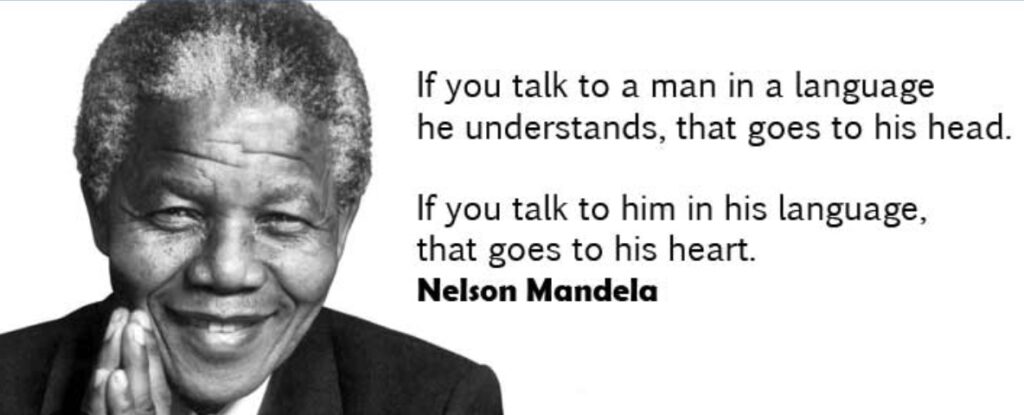
1) “If you talk to a man in a language he understands, that goes to his head. If you talk to him in his own language, that goes to his heart” – Nelson Mandela
With this quote, Mandela brings to life the close tie between one’s language and one’s emotions associated with identity – who a person is in terms of the language and culture that shapes his or her worldview and values. During his twenty-seven years as a political prisoner on Robben Island in South Africa, Mandela set about winning over the Afrikaner guards, the hardest of opponents. Mandela learned Afrikaans and Afrikaner history. In their own language, with reference to their own culture, Mandela reasoned with the guards and sought to understand their hidden fears and honed his persuasion. He practiced his charm. With alarm, the authorities noticed guards softening, and they were replaced regularly.
The often-immediate fraternity that is felt when I speak to someone in their native tongue, especially when it is a language not often learned by non-natives, has always been a great motivator to learn more languages. Learning a foreign language and seeking to understand its associated culture is often a sign of respect. It indicates that you understand the value and validity of the language and culture. It is much easier to form bonds with people from other cultures when you speak their language.
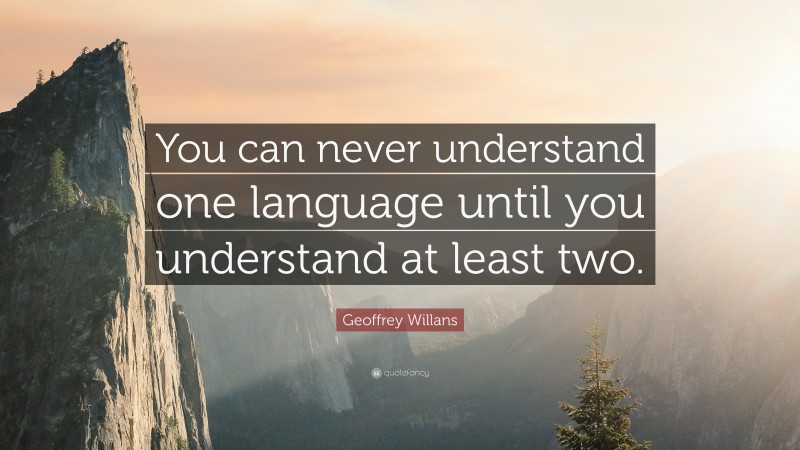
2) “Wer fremde Sprachen nicht kennt, weiß nichts von seiner eigenen.”
Most people realize that a foreign culture serves as a mirror that allows them to examine their own culture. Without experiencing a different culture, we are like the proverbial fish in water that does not understand what water is until the fish is without it. A Japanese traveler from Tokyo realizes how centrally important cleanliness is in their own culture by noticing how many other major cities in the world are not as clean. Our own culture is our default-mode, and we take many of the values, assumptions, beliefs, and expectations as normal and rational. It is only when we confront the reality of differences, other ways of doing things, and other worldviews that we realize that the norms we take for granted are relative and not the absolute mark of a human being.
Likewise, a foreign language serves a mirror for understanding your own mother tongue in the same way that a foreign culture does for understanding your culture more deeply. When I learned Greek, even though I knew many words in English are derived from Greek, I was still amused by how these common everyday banal words in Greek are borrowed to form new words that have a new specific meaning, often academic or esoteric in nature. They often sound so erudite in English but so banal in Greek. My knowledge of Greek helped me understand words that normally I would have to look up in a dictionary – such as the word ‘allocentric’ or oriented towards others (ἄλλος in Greek simply means other). Granted, not everyone is thrilled by etymology.
However, there are many other insights to be gained from studying additional languages such as a greater understanding of grammar and the great diversity of how languages can be structured. Furthermore, only by learning another language and the context of the culture in which the language evolved can we truly understand the meaning of words that do not have a straightforward accurate translation in other languages. The process of understanding these words assists us in understanding how certain words in our own language reflect our cultural context and heritage. People often do not reflect on the origin of everyday common words. For example, breakfast comes from the fact that in the morning when we eat, we are breaking the fast we experienced while we were sleeping (unless you have a habit of raiding the refrigerator while sleepwalking).
Becoming multilingual also creates a keener awareness and sharper perception of language. Foreign language learning enhances the understanding of how language itself works and the ability to manipulate language in the service of thinking and problem solving.

3) “Die Grenzen meiner Sprache sind auch die Grenzen meiner Welt.” “The limits of my language are also the limits of my world.”– Ludwig Wittgenstei3
The quote highlights the profound influence that language has on our perception and understanding of the world around us. It suggests that the boundaries and scope of our language determine the boundaries and scope of our thoughts and experiences.
The quote conveys the idea that language is not just a tool for communication but also a framework through which we interpret and make sense of reality. Our language shapes the concepts, categories, and meanings available to us, influencing how we perceive and conceptualize the world. In this sense, our language acts as a lens through which we view and engage with our surroundings.
Wittgenstein’s quote also suggests that limitations in language can constrain our ability to express certain thoughts or ideas. If our vocabulary or linguistic resources are limited, we may struggle to articulate or fully grasp certain concepts or experiences. Therefore, expanding our language skills can broaden our understanding and enable us to engage with a more diverse range of ideas and perspectives.
Each language offers a particular historical and cultural grounding or a context providing foundation for the meaning of a word. Essentially, language and the culture in which it evolves shape our worldview. In order to go beyond the boundaries of the categorizations of words and phrases in our mind at any given moment, we must increase our vocabulary (labels and categorizations) or employ metaphor or explore a different language and culture.
We can greatly expand the possible understandings of the world around us by increasing our knowledge of other languages and culture in conjunction with expanding and deepening our knowledge of own culture and language. The limitations we take upon ourselves by thinking in terms of particular theories or speaking in particular ways are human limits that we have chosen for ourselves; they are not intrinsic limitations imposed upon us by the world, and this, of course, is something that Wittgenstein wanted to bring to our explicit attention.
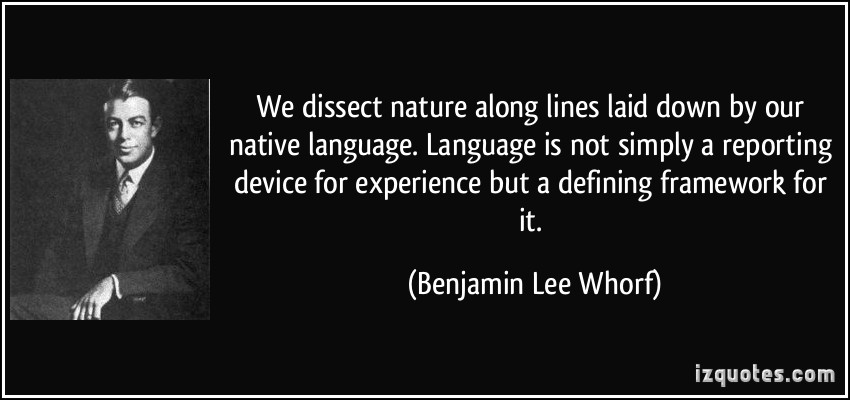
4) “We dissect nature along lines laid down by our native language. Language is not simply a reporting device for experience but a defining framework for it.”– Benjamin Lee Whorf
I interpret the above quote by Wittgenstein to be related to what Whorf is proposing. Humboldt, Sapir, and Whorf are associated with the concept of linguistic relativity, which argues that culture, through language, affects the way in which we think, and especially our classification of the experience world, in other words, our cognitive categories and related concepts.
Notice that I said, “the way in which we think” and not “what we think.” I believe that, when viewed in these terms there is strong support for linguistic relativity. To deny this is to deny that culture ‘can’ affect how we interpret what we perceive, and at times what we perceive through the process of priming (if priming is understood not only as the process in which recent experiences influence how one interprets an event or situation but also non-recent events in which we do not have alternative cognitive categories or related concepts).
Priming is easily empirically confirmed by experiments. For example, if a person reads a list of words including table and is later asked to complete a word starting with the letters tab, a person who has been primed in this manner is more likely to answer table than a person who is not primed. It works for not only semantic repetition but also for perceptual and conceptual stimulus repetition. Culture acts in a sort of long-term priming fashion.
What do I mean by creating cognitive categories? It is the basic cognitive process of arranging into classes or categories; as Whorf (1956: 212-213) contended, “we dissect nature along the lines laid down by our native language. The categories and types we isolate from the world of phenomena we do not find there because they stare every observer in the face … the world is presented in a kaleidoscopic flux of impressions which has to be organized … by the linguistic system in our minds.” In other words, our native language is offering us a set of words/phrases that we may use to classify and categorize the world around us, our experiences, our feelings, etc.
We use categorical schemes to organize our knowledge about a wide range of experiences. Objects and events are grouped mentally into categories according to their characteristics. Such categories form ‘building blocks for human thought and behavior’ (Medin, 1989). Basically, we remember things by organizing thoughts in relation to other thoughts.
Concepts are mental representations of classes or objects or other entities, while categories are classes of objects embodied in the concepts. The way we categorize things depends on prior knowledge consisting of our labels (words) and associated concepts. Obviously, we can learn new labels (words, phrases, collocations) existing in our mother tongue or borrowed from other languages or coin our own words or phrases and seek to explain their value to others so that they may come to be adopted by others.
Cognitive categories are constructed in this process of creating associations between words and what they signify. Cognitive categories are involved in constructing our mental context or our way of thinking, what we tend to pay attention to, what we tend to deem as meaningful and worth noticing, which of the multitude of sensory inputs we filter out and the ones we explicitly and sometimes implicitly process. These acts influence perception, which influences the construction of semantic categories, and these semantic categories in turn facilitate the creation of cognitive categories. Neither is fixed nor immutable and they are related in the same way that language and culture is related.
It is possible to assert that linguistic relativity also applies to cognitive differences among monolinguals of the same mother tongue since we can expand our inventory of words or the semantic categories of existing words (phrases) through metonymy and metaphor in order to facilitate the expansion of the boundaries of abstract thought. When acquiring additional (foreign) languages you are constantly creating new associations between utterances (phonemes, words, phrases) that are hardly ever completely congruent with existing semantic boundaries or semantic categories derived from your native language. New linguistic categories are created in conjunction with new cognitive categories (new ways of perception).
I was under the impression that no other researchers had considered linguistic relatively within the context of one language. Then I found research carried out by Stapel and Semin (2007) entitled “The magic spell of language: Linguistic categories and their perceptual consequences.” Their starting point is the observation that language is a tool that directs attention to different aspects of reality.
They used participants from the same linguistic community and demonstrated in four studies that metasemantic features of linguistic categories influence basic perceptual processes. Their research question was more general and focused on the metasemantic, rather than on the semantic, effect of language. Specifically, they hypothesized that concrete terms (e.g., action verbs) are more likely to direct attention to local properties and details of an object, whereas abstract terms (e.g., adjectives) are more likely to draw attention to the global properties of an object.
Their four studies attest to the idea that by adopting a new, experiment-based approach to the study of linguistic relativity that focuses on the impact of metasemantic (rather than semantic) linguistic categories and on generic (rather than specific) perceptual processes within (rather than between) languages and cultures, it is possible to provide reliable, empirical evidence for the core of Whorf’s (1957) linguistic-relativity hypothesis: Linguistic categories point people to different types of observations. Language is a tool that directs attention to different aspects of reality.
5) 學一門語言,就是多一個觀察世界的窗戶。

The Chinese proverb beautifully captures the essence of multilingualism and its impact on our perception of the world. This proverb suggests that learning a new language expands our perspectives and provides us with additional ways to understand and interpret the world around us.
The metaphorical use of “window” implies that each language we learn acts as a unique lens or viewpoint through which we can observe and engage with different cultures, ideas, and experiences. Just as a window allows us to see beyond the confines of a room, learning a language allows us to go beyond our native language and gain access to new insights, knowledge, and ways of thinking.
By learning a new language, we gain the ability to communicate and connect with people from different linguistic and cultural backgrounds. It opens up opportunities for cultural exchange, fostering a deeper understanding and appreciation of diverse perspectives. Each language brings its own richness, idioms, nuances, and cultural context, providing us with a distinct vantage point to observe and interpret the world.
Furthermore, the proverb suggests that each language offers a unique set of concepts, expressions, and vocabulary that may not exist in other languages. This linguistic diversity allows us to articulate thoughts and experiences that may be challenging or impossible to express in our native language alone. It broadens our intellectual and emotional repertoire, enabling us to engage with the world in more nuanced and comprehensive ways.
In summary, the proverb emphasizes the value of multilingualism as a means to broaden our understanding of the world. Learning a new language is likened to gaining a new window, enabling us to explore different cultures, expand our knowledge, and deepen our appreciation for the diverse tapestry of human experiences.
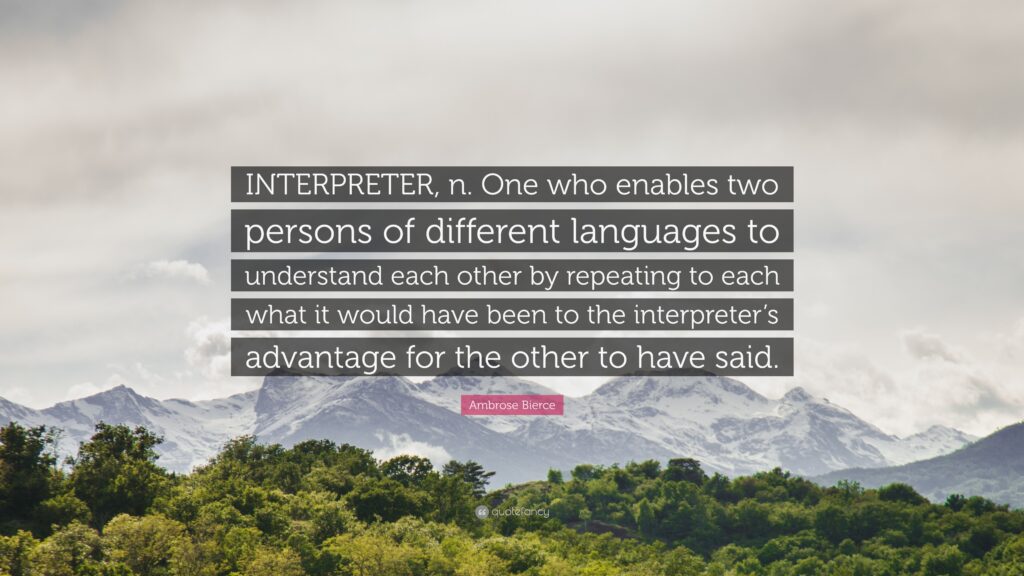
6) “Interpreter, n.: One who enables two persons of different languages to understand each other by repeating to each what it would have been to the interpreter’s advantage for the other to have said.”– Ambrose Bierce
A major conclusion here is that if you are involved in international business, you are much better off if you can at least understand what the interpreter of the language in which you are negotiating is saying. If the other party speaks your language but you do not understand theirs, then you are at a disadvantage. The knowledge of a language usually indicates a substantial knowledge of the culture in which it is embedded. Demonstrating such knowledge in cross-cultural negotiations engenders respect and the appearance of authority. In today’s increasingly globalized environment the value of being able to communicate in numerous languages and deal effectively with diverse cultural contexts is undoubtedly growing.
7) “One language sets you in a corridor for life. Two languages open every door along the way.” - Frank Smith
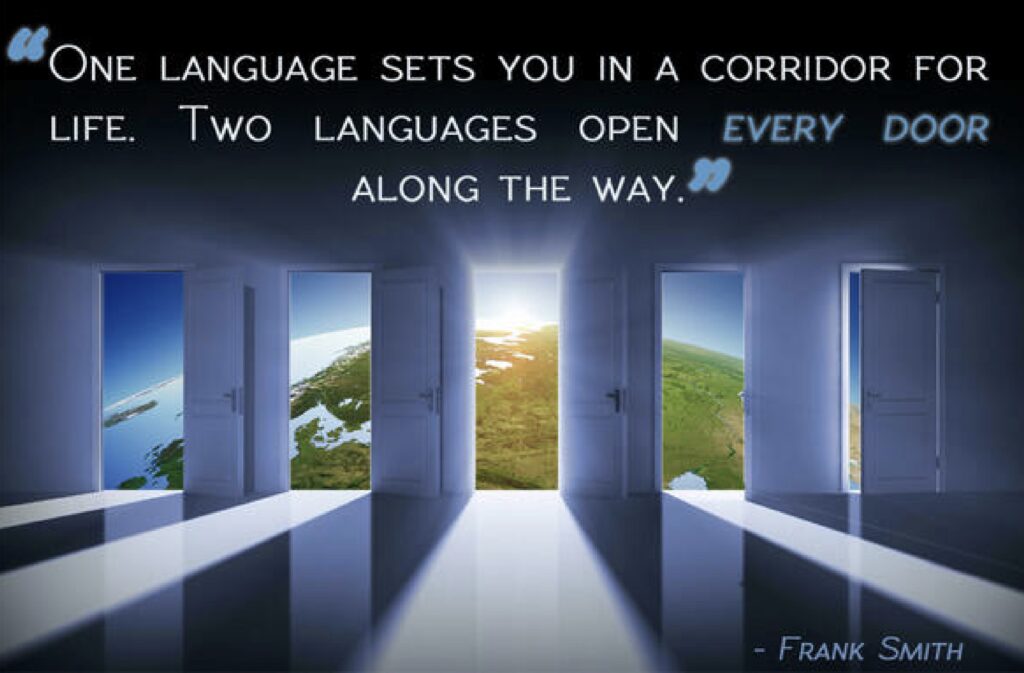
The quote encapsulates the transformative power of multilingualism and its potential to unlock opportunities and broaden horizons.
The first part of the quote suggests that having proficiency in just one language may confine us to a limited path or perspective. It implies that relying solely on a single language restricts our ability to communicate and engage with a diverse range of people and cultures. It can limit our access to various opportunities, both personal and professional, that exist beyond the boundaries of a single language.
In contrast, the second part of the quote highlights the immense benefits of knowing multiple languages. It suggests that being fluent in two or more languages expands our possibilities and opens doors to new experiences, connections, and opportunities. When we are multilingual, we can bridge linguistic and cultural gaps, connect with individuals from different backgrounds, and navigate diverse contexts with greater ease.
Knowing more than one language enables us to communicate effectively in different settings, such as international travel, multicultural workplaces, or global collaborations. It enhances our cultural sensitivity, empathy, and understanding, enabling us to build stronger relationships and foster meaningful connections with people from various linguistic communities.
Moreover, being multilingual often brings practical advantages. It can lead to increased job prospects, as employers value individuals who can communicate with diverse customers, clients, or colleagues. Multilingualism also provides the opportunity to engage with a broader range of literature, media, and cultural expressions, enriching our intellectual and personal growth. It encourages us to embrace multilingualism as a means of opening doors, breaking down barriers, and embracing the richness and diversity of human language and culture.

8) “Language is the road map of a culture. It tells you where its people come from and where they are going.” - Rita Mae Brown
The quote highlights the crucial role of language in understanding and navigating a culture. It suggests that language serves as a guide, providing insights into a culture’s origins, values, aspirations, and direction.
By stating that “language is the road map of a culture,” Brown emphasizes the interconnectedness of language and culture. Language embodies the collective knowledge, beliefs, customs, and shared experiences of a community. It reflects the historical, social, and cultural context in which it has evolved, carrying the accumulated wisdom and traditions of a culture.
The quote also suggests that language reveals where a culture is heading. By examining the language used by a community, we can gain a glimpse into its aspirations, societal changes, and future trajectory. The evolution of language over time reflects shifts in social dynamics, technological advancements, and cultural developments. It provides insights into the values, priorities, and concerns of a culture at a given point in time.
Furthermore, the quote implies that language acts as a bridge between the past and the future. By understanding the language of a culture, we can trace its historical roots, linguistic influences, and cultural exchanges with other communities. Language carries the legacies of the past while also evolving to accommodate new ideas and expressions, indicating the ongoing growth and adaptability of a culture.
In summary, Brown’s quote underscores the significance of language as a key to unlocking the essence of a culture. It suggests that by delving into a language, we can gain a deeper understanding of a culture’s origins, values, and aspirations. Language serves as a roadmap, guiding us through the intricacies of a culture’s past, present, and future, ultimately enabling us to connect with its people on a more profound level.
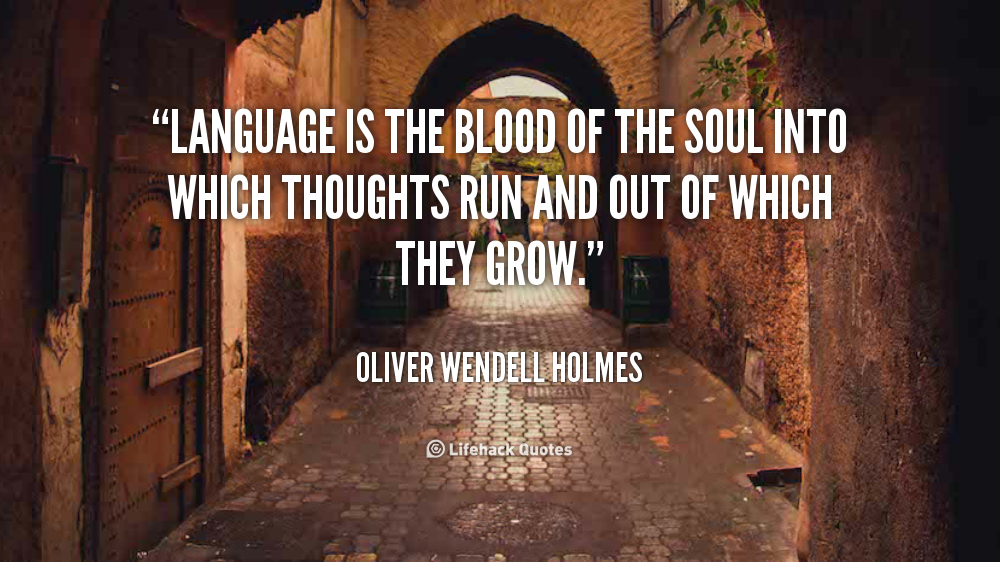
9) “Language is the blood of the soul into which thoughts run and out of which they grow.” - Oliver Wendell Holmes
The quote beautifully captures the profound relationship between language and our inner world of thoughts, emotions, and ideas. It suggests that language is the life force that nourishes and sustains our intellectual and emotional existence.
By stating that “language is the blood of the soul,” Holmes implies that language is not just a superficial tool for communication, but an integral part of our inner being. It is the vehicle through which our thoughts and ideas flow, allowing us to express and share our innermost experiences with others. Language breathes life into our thoughts, enabling them to take shape and grow.
The quote further suggests that language is the medium through which our thoughts expand and evolve. It is the fertile ground from which our ideas sprout and develop. Language provides us with the means to explore and articulate our inner world, allowing us to communicate, reflect, and engage with the world around us.
Moreover, the metaphorical use of “blood” in the quote highlights the vital and inseparable connection between language and our soul or essence. Just as blood sustains our physical body, language nourishes and animates our inner self. It gives voice to our thoughts, desires, and emotions, fostering our sense of identity and enabling us to connect with others at a profound level.
In essence, Holmes’ quote emphasizes the transformative power of language. It highlights that language is not only a means of communication but an essential element of our humanity. Language enables us to navigate the complexities of the human experience, share our unique perspectives, and connect with others on an intellectual and emotional level.
Overall, the quote reminds us of the intrinsic value and significance of language in shaping our inner world and facilitating meaningful connections with others. It celebrates language as the lifeblood that flows through our soul, empowering us to express, understand, and engage with the rich tapestry of thoughts and ideas that define our human existence.
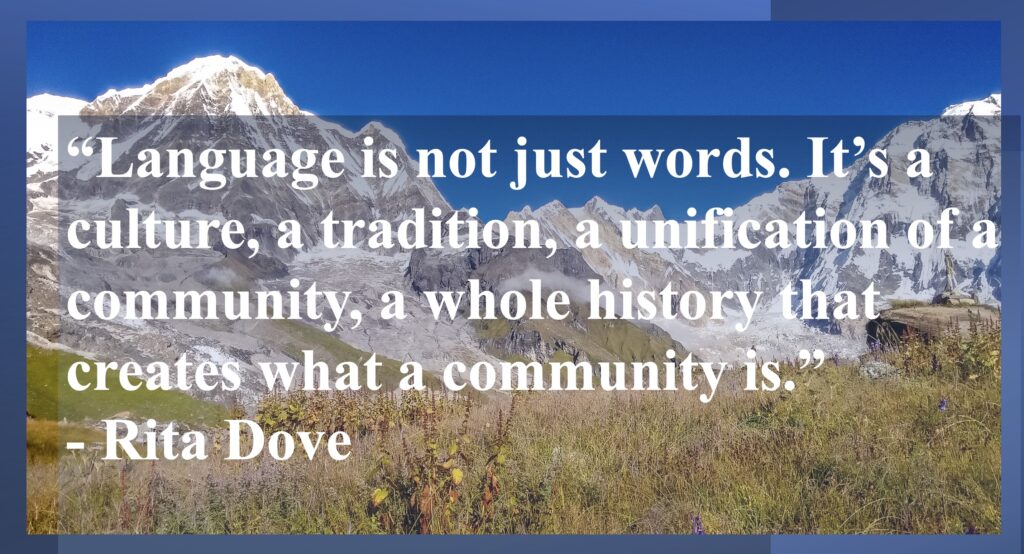
10) “Language is not just words. It’s a culture, a tradition, a unification of a community, a whole history that creates what a community is.” - Rita Dove
The quote beautifully encapsulates the profound significance of language as a multifaceted expression of a community’s identity and collective experience.
By stating that “language is not just words,” Dove emphasizes that language extends beyond mere vocabulary and grammar. It embodies a rich tapestry of cultural elements, traditions, and shared experiences that are interwoven within the linguistic fabric of a community. Language serves as a vessel that carries the collective wisdom, values, and customs that shape the identity of a group of people.
The quote further suggests that language is a reflection of the culture from which it emerges. It encapsulates the unique perspectives, beliefs, and practices that define a community. Language acts as a vehicle for transmitting cultural heritage, preserving historical narratives, and passing on traditional knowledge from one generation to another. It holds within it the stories, songs, proverbs, and oral traditions that have been woven into the community’s collective memory.
Moreover, the quote highlights that language is a unifying force that binds a community together. It serves as a common thread that connects individuals and fosters a sense of belonging and shared identity. Language enables communication and understanding among community members, facilitating cooperation, collaboration, and the establishment of social bonds.
Additionally, the quote implies that language carries the weight of history. It is deeply intertwined with the historical experiences, struggles, triumphs, and cultural evolution of a community. Language bears the imprint of the past, preserving the linguistic expressions, idiomatic nuances, and linguistic legacies that have shaped the community’s identity over time.
In essence, Dove’s quote underscores the multifaceted nature of language and its role in shaping the collective identity of a community. It recognizes that language encompasses not just words but also the cultural, historical, and social dimensions that define a community’s existence. Language is a living embodiment of a community’s culture, traditions, and shared history, serving as a unifying force that connects and shapes the identity of its members.
Reference:
Baker, C. (2006). Foundations of Bilingual Education and Bilingualism (3rd ed.). Clevedon: Multilingual Matters.


